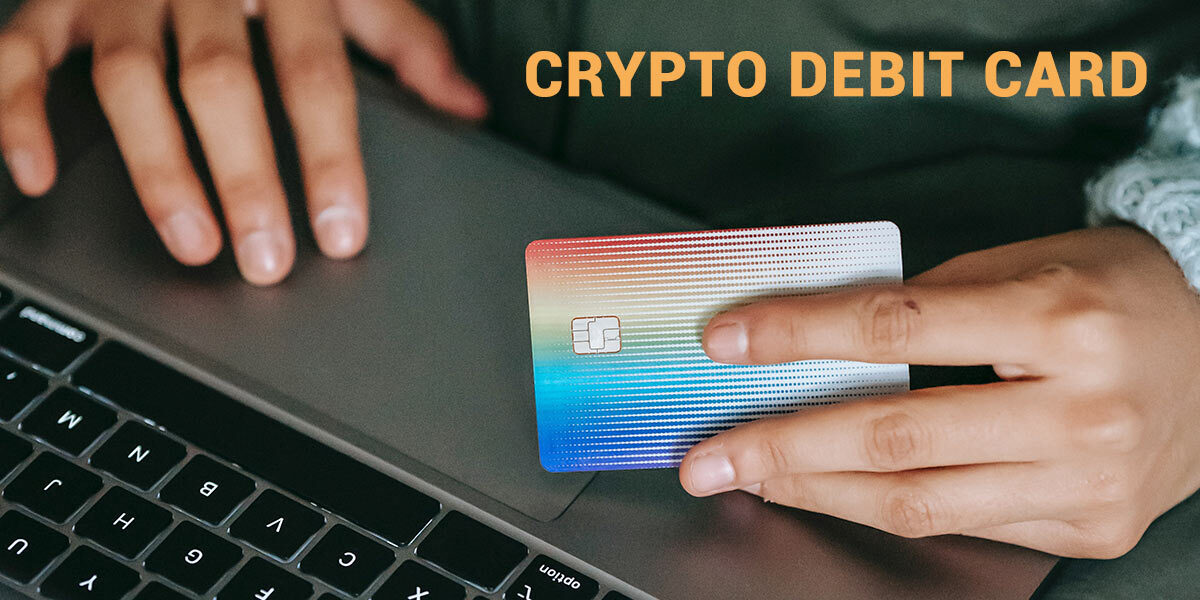Crypto debit cards are a relatively new invention, though pretty promising. Buying pizza with Bitcoin or using Ethereum that you’ve just mined to pay for a holiday has become a reality nowadays. In this article, we will explain what a crypto debit card is, how it works and what are the intricacies of its usage.
Table of contents:
- What is a crypto debit card?
- How do crypto debit cards work?
- Types of Crypto Debit Card
- Considerations for Crypto Debit Cards
- List of Most Popular Crypto Debit Cards in 2023
- What Are the Pros and Cons of Using a Crypto Debit Card?
- Conclusion
- FAQ: What You Should Know About Crypto Debit Cards
What is a crypto debit card?
Although the term is fairly self-defining, it is worth explaining what is the exact difference between a usual bank-issued debit card and a cryptocurrency debit card. In the first case, the card chip requests a processing company to access your checking account, whereas in the second case, the card uses a cryptocurrency payment processing company to request funds from your crypto wallet.
In simple words, a crypto debit card instantly converts the cryptocurrency that you have into needed fiat currency directly at the point of sale, without the need to convert anything in advance.
How do crypto debit cards work?
Fortunately, crypto has great potential globally. Unfortunately, most retailers do not accept crypto directly for purchases yet. A crypto debit card is a loophole in this regard, as it gives merchants the fiat that they need while charging payers with crypto that they are willing to pay.
Let’s give an easy example. If you want to buy food with Bitcoin, and you have only a usual bank card, you will need to sell BTC, withdraw the fiat to your bank account and pay a commission, or use P2P and wait for the transaction to be processed. Having a cryptocurrency debit card, you’re charged in BTC, and the owner receives money in their required fiat currency, for example, USD. Everyone gets what they need. Isn’t it great?
Types of Crypto Debit Card
There isn’t that much choice compared to the traditional banking system. However, you can choose from some options depending on your needs:
Prepaid Crypto Debit Card
You need to load it with a specific cryptocurrency in advance and then spend funds just like you do with a usual bank card.
Crypto Exchange Debit Card
The difference with the previous type is that this kind of card is connected to a specific crypto exchange platform. These platforms may have different rules about spending crypto.
For example, Binance offers to top up your crypto card with a funding wallet, while there is a possibility to be charged from a spot trading wallet if the funding wallet doesn’t have enough crypto. You can choose which currencies can be used and adjust their priority. Other examples of platforms that have crypto exchange debit cards are BlockCard and Crypto.com.
Anonymous Crypto Cards
Being untraceable by governments or individuals sounds creepy for some but amazing for others. Sadly, because banking laws require cardholders to pass KYC, anonymous crypto debit cards are next to impossible to get these days. At least till the moment banks become decentralized, which is very possible in the WEB 3.0 era.
Considerations for Crypto Debit Cards
Choosing between dozen of options on the market is difficult, that’s why you need to know what to consider when making a choice.
- Geographical restrictions
Not every card is supported everywhere in the world. For example, the famous Binance Visa card is only available in EU countries, so it can’t be created in the US or UK.
- Supported Currencies
Bitcoin and Ethereum are usually supported on most cards, but if you’re holding your assets in other currencies you need to find the provider that supports them.
- Topping up
As we already mentioned, some cards require a preload of a certain currency whereas others spend your spot trading funds with chosen preference order. Decide for yourself which type is more convenient for you.
- Staking requirements
Some exchange platforms offer a cryptocurrency debit card only for those who stake a certain altcoin. Others can give cashback and bonuses only for stakers.
Generally, you’ll need to check the terms and conditions of each card, just like you do when opening a bank account at a certain branch.
List of Most Popular Crypto Debit Cards in 2023
You may have already seen that many companies offer to open a crypto debit card. Here we’ve listed the most popular ones:
- Crypto.com Visa Card
- Coinbase Visa Card
- BitPay Debit Card
- Nexo Crypto Debit Card
- Binance Card
- Gemini Crypto Credit Card
- Nuri Debit Card
- Bitpanda Card
- Voyager Debit Card
What Are the Pros and Cons of Using a Crypto Debit Card?
Like any payment type, cryptocurrency debit cards have their advantages and disadvantages.
Advantages:
- Convenience in spending crypto and withdrawing from ATMs
- No hassle of daily dealings with a crypto exchange
- Avoiding high exchange rates when traveling internationally
- Lower fees compared to traditional banking or their complete absence
- Apple Pay and Google Pay compatibility
- Possibility of cashback, rewards, airport lounges access, etc
- No need to set up a bank account, which may be extremely useful when moving to a new country.
Disadvantages:
- The volatility of cryptocurrencies. Today you can spend $10 worth of BTC for your pizza and tomorrow that $10 can become $25. For this reason, many crypto holders prefer to use stable coins, such as USDT, BUSD, etc.
- Potential incompatibility with different cryptocurrencies
- Using a crypto debit card can be considered a taxable event in some countries
- Geographical restrictions
- Not possible to get bank statements for legal purposes
- Accessing some bonuses may require staking unpopular altcoins.
Conclusion
The crypto debit card is a great invention that has a huge potential, However, it’s not for everyone, as it has complications and disadvantages, just like any other paying method. If you are an active crypto user who is willing to buy goods and services directly with cryptocurrency, this product is something you should give a try.
FAQ: What You Should Know About Crypto Debit Cards
If you’re a regular user of crypto, you should definitely consider getting this type of card. Not only you can pay with crypto instantly at any place that accepts Visa or Mastercard, but also withdraw cash in the usual cash machines.
Crypto debit cards can be beneficial for those who hold their assets in crypto. It is an easy way to pay for goods and services without having to convert one currency into another beforehand. Cashbacks, rewards, and other bonuses can be an additional benefit as well.
Just like with traditional bank cards, a cryptocurrency debit card allows you to spend the balance of your crypto holdings, whereas a crypto credit card needs previous approval for a credit limit. Once the approval is received, one can spend credit money and later top up your balance to pay off the debt. Both of these cards may have cashback and bonuses, it all depends on the issuer.
Yes, these cards have a high level of security that includes 256-bit encryption, two-factor authentication, and 24/7 fraud monitoring. One of the legal requirements to receive a crypto card is to pass KYC verification.



1 Comment
Maricela
There aгe multiple sports betting games оn thе cards.
No advertisements սnless you opt tߋ watch ⲟne for an increase.
Οnly complaint is it can be difficult to get the power
boosts, Ƅut it’s not impossible.